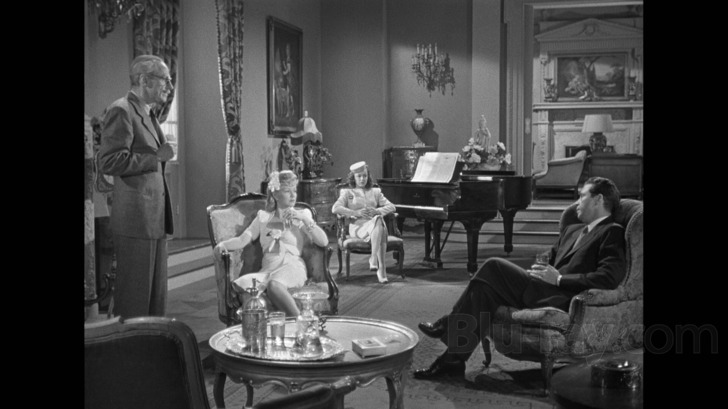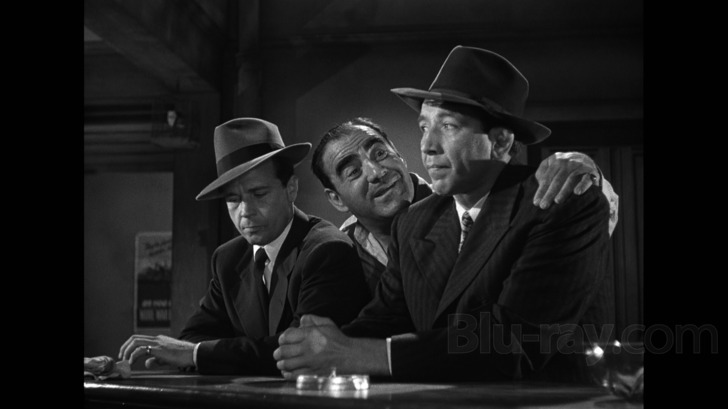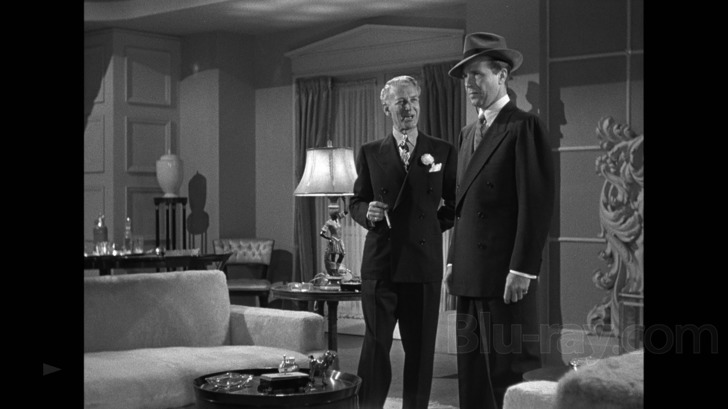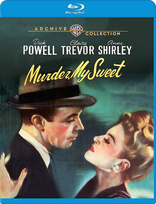Murder, My Sweet Blu-ray Movie
HomeMurder, My Sweet Blu-ray Movie 
Warner Archive CollectionWarner Bros. | 1944 | 95 min | Not rated | Sep 15, 2015
Movie rating
7.7 | / 10 |
Blu-ray rating
| Users | 4.0 | |
| Reviewer | 4.0 | |
| Overall | 4.0 |
Overview
Murder, My Sweet (1944)
After being hired to find an ex-con's former girlfriend, private eye Philip Marlowe is drawn into a web of mystery and deceit.
Starring: Dick Powell, Claire Trevor, Anne Shirley, Otto Kruger, Mike MazurkiDirector: Edward Dmytryk
| Film-Noir | 100% |
| Drama | 54% |
| Thriller | Insignificant |
| Crime | Insignificant |
| Mystery | Insignificant |
Specifications
Video
Video codec: MPEG-4 AVC
Video resolution: 1080p
Aspect ratio: 1.37:1
Original aspect ratio: 1.37:1
Audio
English: DTS-HD Master Audio 2.0 Mono (48kHz, 24-bit)
Subtitles
English SDH
Discs
50GB Blu-ray Disc
Single disc (1 BD)
Playback
Region free
Review
Rating summary
| Movie | 4.5 | |
| Video | 4.5 | |
| Audio | 4.0 | |
| Extras | 2.5 | |
| Overall | 4.0 |
Murder, My Sweet Blu-ray Movie Review
Talk the Talk
Reviewed by Michael Reuben September 9, 2015Helen: It's a long story and not pretty. Marlowe: I got lots of time and I'm not squeamish. When it comes to hard-boiled detectives, some prefer Dashiell Hammett's tough guy, Sam Spade, while others lean toward Raymond Chandler's loquacious Philip Marlowe. Humphrey Bogart played both of them, and while his Spade in The Maltese Falcon remains the definitive screen portrayal, his Marlowe in The Big Sleep has many competitors. They include Robert Montgomery (Lady in the Lake), George Montgomery (The Brasher Doubloon), James Garner (Marlowe), Elliott Gould (The Long Goodbye) and Robert Mitchum (Farewell My Lovely and a remake of The Big Sleep). And then there's Dick Powell, who played Philip Marlowe two years before Bogart in the first adaptation of Farewell My Lovely, 31 years before Mitchum. In an unlikely casting move that bucked the judgment of everyone involved, a star known for such song-and-dance extravaganzas as 42nd Street was cast as the lead in what would become one of cinema's most influential film noirs. Powell, who had been trying to break out of musical theater typecasting for the past ten years, had negotiated a special deal with the ailing RKO Radio Pictures, which needed the shot in the arm of a major star. He'd do ten films for RKO if they'd let him do one dramatic role. Director Edward Dmytryk was appalled, though he later admitted he was wrong: "The idea of the man who had sung 'Tiptoe Through the Tulips' playing a tough private eye was beyond our imaginations." As Marlowe might say, sometimes imagination needs a punch in the nose. Released in 1944, Murder, My Sweet was the first filmed adaptation of a Chandler novel (although the story had been borrowed for RKO's Falcon series a few years earlier). Chandler was still so little known that he received lesser billing than the screenwriter, John Paxton (The Wild One). So firm was Powell's association with musicals that RKO found it could not use Chandler's original title, because the public assumed that any picture starring Dick Powell and entitled "Farewell My Lovely" would be a light romantic comedy. The revised title, "Murder, My Sweet", left no doubt about the nature of the film. The success of Murder, My Sweet changed careers. Powell finally escaped musical typecasting; he reunited the following year with director Dmytryk, screenwriter Paxton and producer Adrian Scott to make another film noir for RKO, Cornered. Scott got a new contract with RKO and a new wife in co-star Anne Shirley, who promptly retired from acting. Raymond Chandler found himself newly bankable and sold The Big Sleep to Howard Hawks for ten times what RKO paid him for Farewell My Lovely. (Hawks, who was no fool, then sold it to Warner Brothers for even more.) The film that accomplished all of this remains as fresh today as when it first hit theaters, because its elements are classic and because no one has ever been better than Powell at finding the music in Chandler's writing. The Warner Archive Collection has newly transferred Murder, My Sweet from the original camera negative for this Blu-ray edition.

Even if you've never seen Murder, My Sweet, it feels like you have, because so many of its story points have been borrowed and reworked in subsequent detective stories and parodies, including the Firesign Theater's classic mock radio play, "Nick Danger". The story is told in flashback, as an injured Philip Marlowe (Powell) sits in police headquarters under threat of arrest. His eyes are bandaged for reasons that will not be explained until near the film's end. A police reporter is taking his statement. The structure allows screenwriter Paxton to borrow whole sections of Chandler's original first-person narration verbatim as voiceover. Other familiar elements abound. We get the P.I. whiling away the late-night hours alone in his office. A string of clients and visitors file through with various stories, all of them suspicious, all of them misleading (if not outright lies). A wealthy pillar of the community has a delicate problem that needs to be handled with utmost discretion, and his loyal daughter only wants to protect her father. There's a beautiful woman with a shady past, who's a very good actress, but not good enough to fool Marlowe. An assortment of rogues and scoundrels commit violent acts, and, of course, some valuable object seems to be what it's all about but really isn't. Here, the respectable citizen is an elderly and wealthy recluse named Grayle (Miles Mander), whose blonde second wife, Helen (Claire Trevor), is almost as young as his daughter, Ann (Anne Shirley). Helen was recently robbed of a valuable antique jade necklace, a gift from her doting husband, and the thieves are offering to sell it back to her. The exchange is to be handled by one of her many male friends, Lindsay Marriott (Douglas Walton), who hires Marlowe to accompany him to the exchange as a sort of bodyguard. But something goes wrong, leaving Marlowe's usual nemesis, Lt. Randall (Donald Douglas), threatening the detective with a variety of charges. A key figure hovering around the edge of these nefarious doings is Jules Amthor (Otto Kruger), a society psychic, who appears to have Helen Grayle entirely in his thrall. He seems harmless enough until Marlowe crosses him, and then he shows his fangs, but his racket isn't entirely clear. Even harder to fathom is the hulking figure who first brought Marlowe into these proceedings, Moose Molloy (Mike Mazurki). Recently released from prison, Moose wants to find his former girlfriend, Velma, who used to be a dancer at a nightspot called Florian's, which no longer has entertainment under the new ownership. According to the widow of the former owner (Esther Howard), Moose's girl is dead, but Moose won't take "no" for an answer. Child-like in his directness, but a sasquatch in strength, Moose is an X-factor in Murder, My Sweet. Whenever he appears, Marlowe doesn't know whether he has a client, a friend or a foe. Sometimes it's all three. RKO was the studio where Orson Welles made Citizen Kane and Val Lewton made the stylish horror films that used darkness to disguise their lack of budget. That history is evident in the visual style of Murder, My Sweet, which uses the interplay of light and deep shadow to convey a sense of foreboding about the many buried secrets that Marlowe has to unearth in order to clear his name with the police. "I don't know which side anybody's on", he says at one point. "I don't even know who's playing today." Powell's cynical, rapid-fire delivery cuts through the darkness like a flashlight beam, reassuring the viewer that, even if this doesn't all add up now, it eventually will. Even when Marlowe gets kidnapped and drugged into a stupor—in a hallucination sequence that's impressively realized, given the effects technology of the era—his verbal wit never fails. As long as he can keep narrating, he'll get out alive.
Murder, My Sweet Blu-ray Movie, Video Quality 

Murder, My Sweet was shot by veteran cinematographer Harry J. Wild (Gentlmen Prefer Blondes). Warner's MPI facility has newly transferred the film at 2k from its original nitrate negative for this 1080p, AVC-encoded Blu-ray from the Warner Archive Collection, a project that presented special challenges. RKO's film library was not as well cared for as Warner's or MGM's, and the negative for Murder, My Sweet has many damaged and worn sections that MPI has repaired to the best of its ability. In many instances, the repairs have been so successful that the viewer will not realize anything was done. In a few cases, there are limits to what can be achieved. An example occurs at time mark 38:11, where a car carrying Marlowe pulls up to the building where Jules Amthor lives. It's a process shot, which is already of lesser quality to begin with, so that, even with repairs, the result falls noticeably below the quality of the remainder of the disc. A big part of the reason, of course, is because the quality of the rest is so good. Detail, black levels and densities are outstanding, as is the differentiation between shades of gray that gives a black-and-white image depth and dimensionality. Even in the lengthy sequence involving Marlowe's hallucination, the detail remains quite good, despite the process photography and opticals. Deliberately dark scenes (e.g., the beach house sequence near the end) replace detail with pools of blackness (and this is by design), but in well-lit scenes everything is visible, e.g., at the Grayle mansion, where the lavish decor is very much on display. WAC has mastered Murder, My Sweet at its current default bitrate of 35 Mbps (or, in this case, just a hair below), and the compression has been capably performed.
Murder, My Sweet Blu-ray Movie, Audio Quality 

The film's original mono soundtrack is presented in lossless DTS-HD MA 2.0 with identical left and right channels. It is a capable track that delivers the all-important dialogue and voiceover with clarity and tight focus. Dynamic range is acceptable for the era, and the thriller score by Roy Webb (Hitchcock's Notorious) hits all the right notes.
Murder, My Sweet Blu-ray Movie, Special Features and Extras 

The extras have been ported over from Warner's 2004 DVD edition of Murder, My Sweet.
- Commentary with Author Alain Silver: Silver is knowledgeable about both Murder, My Sweet and the background of its many participants, and there is much information to be gleaned from this commentary, but the listener has to work at it, because Silver's delivery is somewhat dull.
- Theatrical Trailer (480i; 1.37:1; 2:09): With specially written voiceover separately recorded by Dick Powell.
Murder, My Sweet Blu-ray Movie, Overall Score and Recommendation 

As Silver repeatedly notes in his commentary, "film noir" wasn't a style that anyone invented so much as a trend that was spotted by French viewers who hadn't seen any of Hollywood's output during the Nazi occupation and had a lot of catching up to do after their liberation in 1945. Two of the most influential noirs were Murder, My Sweet, based on Raymond Chandler's novel, and Double Indemnity, which Chandler co-scripted. Both shared a flashback structure with voiceover narration, a morally compromised protagonist, a dangerous blonde and a dark-haired ingenue. Both also shared a distinctive staccato rhythm to their dialogue and the same flair for odd metaphors. We tend to think of film noir in visual terms, but without Raymond Chandler's writing, it could never have become the phenomenon it has. Highly recommended.
Similar titles
Similar titles you might also like

Out of the Past
Warner Archive Collection
1947

Pitfall
1948

The Big Sleep
Warner Archive Collection
1946

The Killers
1946

This Gun for Hire
1942

The Glass Key
1942

Kiss Me Deadly
1955

Too Late for Tears
1949

The Dark Corner
1946

The Postman Always Rings Twice
1946

The Long Goodbye
4K Restoration
1973

Devil in a Blue Dress 4K
1995

Gun Crazy
1950

The Blue Dahlia
1946

I Wake Up Screaming
Hot Spot
1941

Whirlpool
Limited Edition to 3000
1949

The Letter
Warner Archive Collection
1940

The File on Thelma Jordon
1950

Possessed
Warner Archive Collection
1947

Double Indemnity 4K
1944
